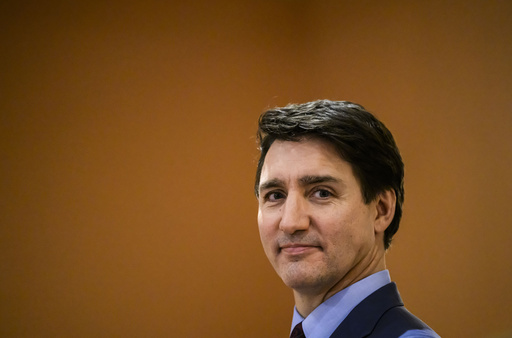TORONTO — Prime Minister Justin Trudeau of Canada is set to make changes to his Cabinet on Friday, as confirmed by his office late Thursday. Trudeau is anticipated to partake in the swearing-in ceremony and preside over a meeting with his new Cabinet later today.
Trudeau’s leadership is encountering increasing scrutiny, particularly following the unexpected resignation of his finance minister earlier this week, which may have serious implications for his tenure. There is a growing chorus among Liberal lawmakers urging Trudeau to step down; however, newly appointed Finance Minister Dominic LeBlanc asserted on Thursday that Trudeau still retains “the full support of his Cabinet.” LeBlanc acknowledged the concerns raised by party members who are calling for Trudeau’s resignation, indicating that Trudeau is attentive to those views and is considering their feedback.
Staying focused on governance, LeBlanc emphasized the importance of not becoming introspective while addressing challenges, particularly the looming threat posed by President-elect Donald Trump, who plans to introduce a 25% tariff on all Canadian goods upon taking office next month. He highlighted his scheduled post-Christmas meeting with Trump’s incoming “border czar” Tom Homan to discuss Canada’s border security strategy aimed at mitigating the possible impact of such tariffs.
Having led Canada for nearly ten years, Trudeau’s popularity has waned due to a variety of factors, including escalating living costs and soaring inflation rates. While Trudeau’s party lacks a mechanism to oust him in the immediate future, he could choose to resign, or the Liberal Party might be ousted through a “no confidence” vote in Parliament, which could lead to an election likely favoring the Conservatives.
As more Liberal lawmakers voiced their discontent with Trudeau this week, Natural Resources Minister Jonathan Wilkinson expressed that “time for reflection” should be afforded to the Prime Minister. The call for Trudeau’s resignation became more urgent when Chrystia Freeland, the finance minister and deputy prime minister, resigned, citing dissatisfaction with Trudeau’s economic strategies amid the tariffs threatened by Trump. Prior to Freeland’s departure, the housing minister had also resigned.
Trudeau’s government has relied significantly on the left-wing New Democratic Party’s support to maintain its position in Parliament, especially since they do not hold an outright majority. However, that support is dwindling, with the leader of the NDP now urging Trudeau to resign. This development heightens the possibility of a “no confidence” motion being brought forward.
NDP leader Jagmeet Singh has hesitated to commit to toppling the government immediately due to the potential repercussions of Trump’s tariffs and the necessity for Parliament to respond constructively. Currently, Parliament is on recess for the holidays and will reconvene late next month, with the possibility of scheduling a “no confidence” vote on the horizon.
As Nelson Wiseman, an emeritus professor at the University of Toronto, noted, it seems likely that Trudeau will eventually step aside, though the timing remains unclear. He remarked that while the Cabinet shuffle may be intended to fill vacant roles and ease workload pressures on certain ministers, it is unlikely to revive the Liberal Party’s dwindling poll numbers at this late stage.
Finally, LeBlanc also remarked that Mark Carney, the former head of the Bank of England and Bank of Canada, will not be joining Trudeau’s Cabinet. Despite Trudeau’s efforts to recruit Carney who has expressed an interest in political leadership and possibly leading the Liberal Party, LeBlanc clarified that Carney is not poised to assume the role of Canada’s finance minister anytime soon. LeBlanc stated that he has been tasked by the Prime Minister to prepare for the upcoming budget expected in the spring.



